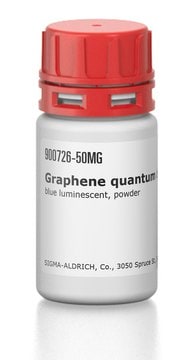776793
InP/ZnS quantum dots
stabilized with oleylamine ligands, fluorescence λem 560 nm, 5 mg/mL in toluene
Sinónimos:
Cadmium free core shell quantum dots, Cadmium free quantum dots, Core/Shell heavy metal free quantum dots, Fluorescent nanocrystals
About This Item
Productos recomendados
Nivel de calidad
Formulario
liquid
concentración
5 mg/mL in toluene
fluorescencia
FWHM <85 nm, quantum yield ~25%
λem 560 nm
temp. de almacenamiento
2-8°C
¿Está buscando productos similares? Visita Guía de comparación de productos
Aplicación
and the corresponding regulations worldwide makes these InP/ZnS quantum dots as more desirable alternatives for consumer applications.
Otras notas
Palabra de señalización
Danger
Frases de peligro
Consejos de prudencia
Clasificaciones de peligro
Aquatic Chronic 3 - Asp. Tox. 1 - Carc. 1B - Flam. Liq. 2 - Repr. 2 - Skin Irrit. 2 - STOT RE 1 - STOT RE 2 - STOT SE 3
Órganos de actuación
Central nervous system, Lungs, Respiratory system
Clase de riesgo para el agua (WGK)
WGK 3
Punto de inflamabilidad (°F)
closed cup
Punto de inflamabilidad (°C)
closed cup
Elija entre una de las versiones más recientes:
¿Ya tiene este producto?
Encuentre la documentación para los productos que ha comprado recientemente en la Biblioteca de documentos.
Artículos
Since the first report of the low-cost dye-sensitized solar cell (DSSC) in 1991 by Gratzel and his coworker,1 dye-sensitized solar cells (DSSC) has been regarded as one of the most promising photovoltaic technologies because of their transparent and colorful characteristics, as well as low cost.
Professor Sharma and colleagues review the synthesis and applications of this novel material. This includes a discussion of the unique properties of quantum dots and their suitability for solar cell applications, along with common synthesis techniques used to develop these materials.
Professor Xiaohu Gao (University of Washington, USA) provides a overview of recent quantum dot (QD) advancements and their potential for advancing bioassay and bioimaging technologies.
Synthesis of Halide Perovskite Quantum Dots for Display Applications
Nuestro equipo de científicos tiene experiencia en todas las áreas de investigación: Ciencias de la vida, Ciencia de los materiales, Síntesis química, Cromatografía, Analítica y muchas otras.
Póngase en contacto con el Servicio técnico






